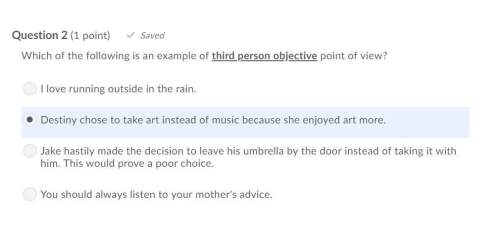
English, 10.09.2021 18:30 Victor3756
What is the effect of the simile, “A buzzer sounded in George’s head. His thoughts fled in panic, like bandits from a burglar alarm.”?
a. It makes the reader feel empathy for George.
b. It implies criminal activity is rampant in their society.
c. It carries the connotation that thinking is a crime.
d. It shows the government has total control of society in 2081.
(Harrison Bergeron Story)

Answers: 1


Other questions on the subject: English


English, 22.06.2019 03:30, starsinopoli13
The major was a little man with upturned mustaches. he had been in the war in libya and wore two wound-stripes. he said that if the thing went well he would see that i was decorated. i said i hoped it would go well but that he was too kind. i asked him if there was a big dugout where the drivers could stay and he sent a soldier to show me. i went with him and found the dugout, which was very good. the drivers were with it and i left them there. what effect does hemingway’s limited use of adjectives have? it slows down the narration by interrupting the action. it makes the few descriptive words he does use more vivid and forceful. it makes the narrator seem powerless and insincere. it prevents the readers from filling in the details with their own experiences.
Answers: 2

English, 22.06.2019 04:50, ilawil6545
Read the passage, then answer the question that follows. no one could have seen it at the time, but the invention of beet sugar was not just a challenge to cane. it was a hint—just a glimpse, like a twist that comes about two thirds of the way through a movie—that the end of the age of sugar was in sight. for beet sugar showed that in order to create that perfect sweetness you did not need slaves, you did not need plantations, in fact you did not even need cane. beet sugar was a foreshadowing of what we have today: the age of science, in which sweetness is a product of chemistry, not whips. in 1854 only 11 percent of world sugar production came from beets. by 1899 the percentage had risen to about 65 percent. and beet sugar was just the first challenge to cane. by 1879 chemists discovered saccharine—a laboratory-created substance that is several hundred times sweeter than natural sugar. today the sweeteners used in the foods you eat may come from corn (high-fructose corn syrup), from fruit (fructose), or directly from the lab (for example, aspartame, invented in 1965, or sucralose—splenda—created in 1976). brazil is the land that imported more africans than any other to work on sugar plantations, and in brazil the soil is still perfect for sugar. cane grows in brazil today, but not always for sugar. instead, cane is often used to create ethanol, much as corn farmers in america now convert their harvest into fuel. –sugar changed the world, marc aronson and marina budhos how does this passage support the claim that sugar was tied to the struggle for freedom? it shows that the invention of beet sugar created competition for cane sugar. it shows that technology had a role in changing how we sweeten our foods. it shows that the beet sugar trade provided jobs for formerly enslaved workers. it shows that sweeteners did not need to be the product of sugar plantations and slavery.
Answers: 1
You know the right answer?
What is the effect of the simile, “A buzzer sounded in George’s head. His thoughts fled in panic, li...
Questions in other subjects:

Mathematics, 13.04.2021 15:50

Mathematics, 13.04.2021 15:50




Mathematics, 13.04.2021 15:50

English, 13.04.2021 15:50


Mathematics, 13.04.2021 15:50




